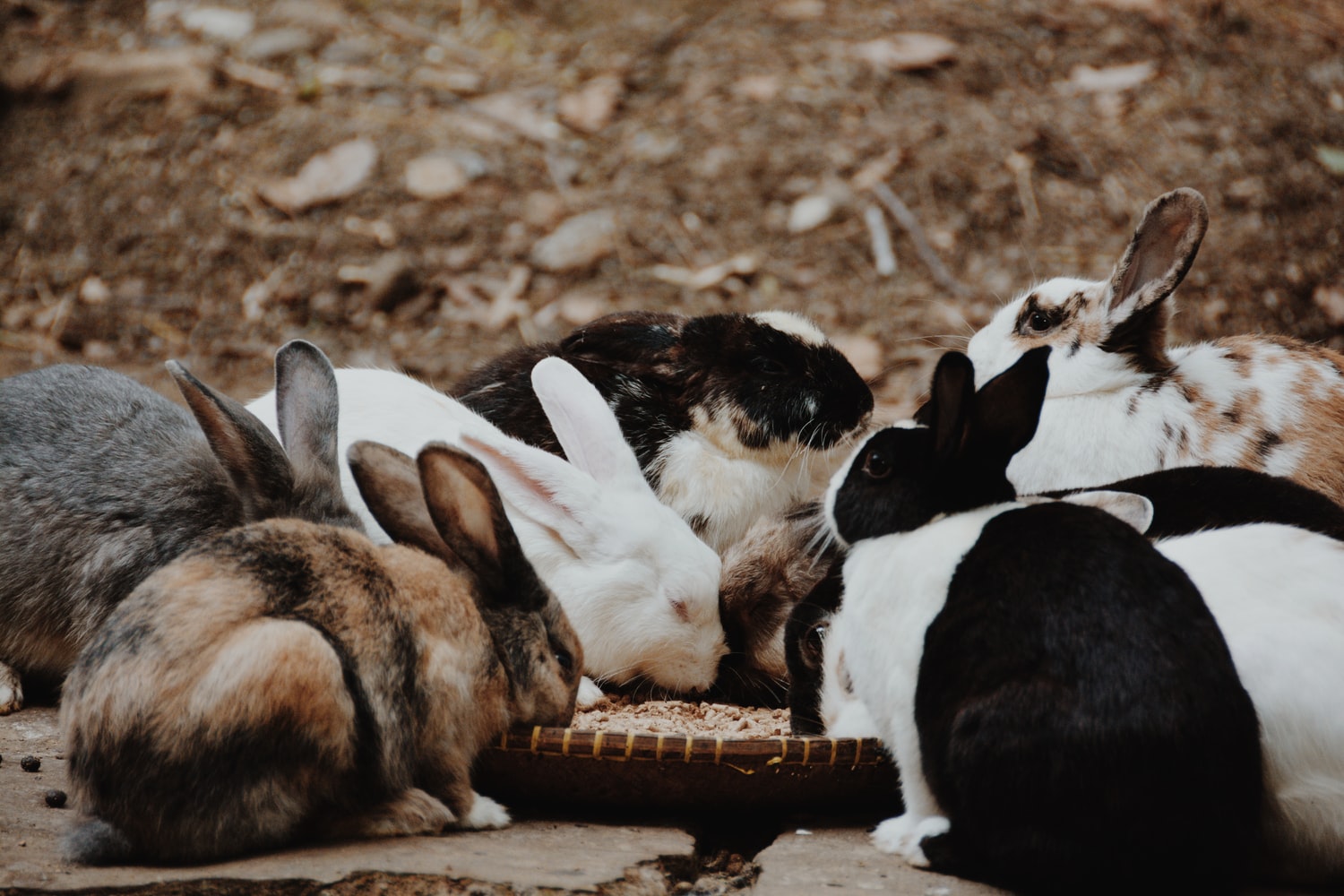What to Feed Your Bunny

A healthy adult bunny’s diet should consist of unlimited hay and grass, also safe veggies/greens, non-muesli pellets and occasional fruit/treats. This diet will maintain healthy teeth and a healthy digestive system.
—
BASIC DIET
![]() Hay
Hay
Give each bunny a clump of fresh hay the size of her body every day even if she hasn’t finished the hay from the day before. Bunnies shouldn’t go without hay for even one day because they need a LOT of fibre. Oat hay, teff/eragrostis hay, mountain/meadow hay, orchard grass. Don’t mistake straw for hay. Straw has no nutritional value (it is dry, yellow, and hollow in the middle). Lucerne (aka alfalfa) is not a grass hay but rather a legume and should only be fed as a treat due to high calcium content.
![]() Fresh grass
Fresh grass
Give fresh grass whenever possible. Bunnies’ teeth are constantly growing and need to be worn down by grass. It contains silica which wears the teeth down better than anything else. It’s really only good within minutes of picking so if you don’t have a garden, why not plant some grass in trays?
![]() Greens
Greens
Give each bun 1 to 2 cups of safe herbs or veggies every day. These include: basil, mint, coriander, rosemary, thyme, fennel, oregano, sage, lavender, carrot tops, dandelion leaves and flowers, rose/hibiscus flowers (watch out for pesticides), lettuce (except for cos and iceberg which make bunnies sick). Click here and here for more comprehensive lists of safe plants.
![]() Good quality pellets
Good quality pellets
Give each bun 1 to 2 tablespoons of brown bunny pellets every day. Just plain brown pellets, please. Corn, peas and seeds in some pellet mixes can cause tummy and teeth trouble, actually shortening a bunny’s life. We recommend: Burgess Excel, Selective, Bunny Chow, Verse Laga Crispy Snack, Marltons plain brown pellets. Reduce pellets if bunny is overweight or won’t eat enough hay.
![]() Treats
Treats
These are optional and should only be allowed in small quantities (no more than 1 teaspoon per day), including apple, pineapple, carrot, banana, raisins, grapes, papaya, mango, watermelon. Remove all seeds, except on strawberries.
–
YOUNG BUNNIES’ NEEDS DIFFER
![]() 0 – 8 weeks
0 – 8 weeks
These buns are too young to be away from their mom and their best chance of survival is to be reunited with mom. If this is not possible, they should be given Royal Canin kitten milk and Protexin (Available at vet shop). Please don’t attempt to feed a tiny baby bunny without seeking help from us at BHSA first as it is quite tricky.
![]() 9 weeks – 6 months
9 weeks – 6 months
The basic diet indicated above should be supplemented with unlimited alfalfa/lucerne hay for bone growth, extra pellets and rolled oats for weight gain.
–
IMPORTANT TIPS
![]() Always introduce new foods gradually.
Always introduce new foods gradually.
This allows you to see if your bunny’s system tolerates it. Stop feeding the specific food immediately if your rabbit has runny poop. Only try something new once his stool is back to normal.
![]() NEVER starve your bunny
NEVER starve your bunny
Not before an operation or for any other reason. They can’t vomit under anaethetic so it’s better to feed as usual to avoid tummy trouble.
![]() NEVER feed ‘muesli mixes’
NEVER feed ‘muesli mixes’
Those colourful mixtures made for bunnies are dangerous. Bunnies cannot properly digest corn, peas and seeds. Feeding these foods will jeopardize their digestive and dental health. In the long term it can shorten their life span. Muesli mixes also encourages selective feeding (picking out the good bits), which can lead to nutrient deficiency.
–
Photo: Mazaya Annaptashafa / Unsplash
